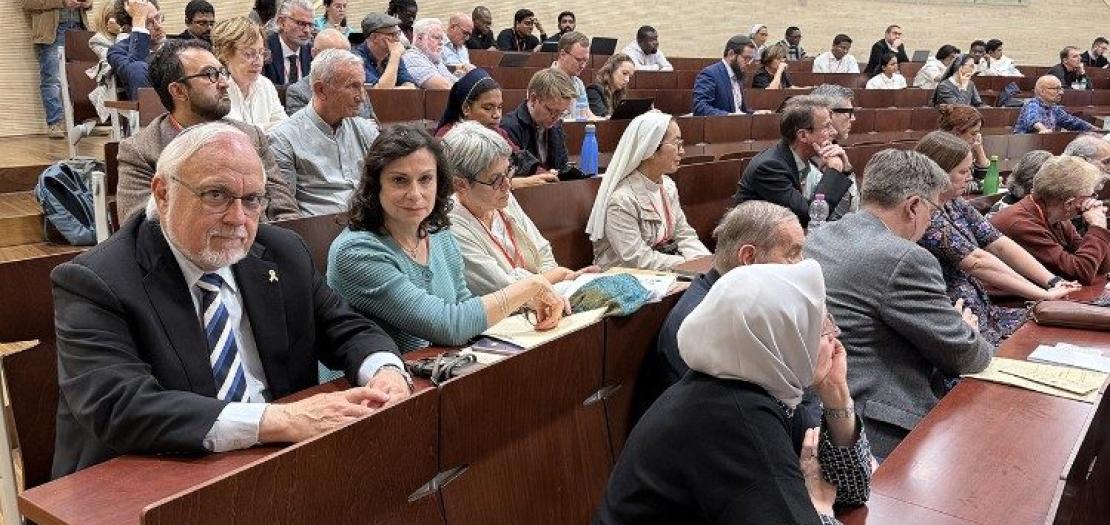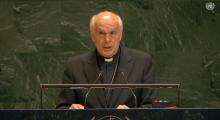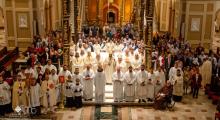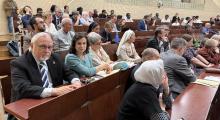Issued by the Catholic Center for Studies and Media - Jordan. Editor-in-chief Fr. Rif'at Bader - موقع أبونا abouna.org

Conference on Nostra Aetate at the Pontifical Gregorian University
The Pontifical Gregorian University in Rome has hosted a three-day conference with the theme “Towards the Future: Re-Thinking Nostra Aetate Today.” It brought together leading scholars and representatives of Christian, Muslim, Hindu, and Jewish academic institutions for a series of in-depth discussions and reflections.
How would Nostra Aetate be written today?
Participants reflected on how Nostra Aetate might be “written” today—within a very different historical and cultural context, and amid new complexities and forms of religious pluralism. Traditions once considered peripheral have gained prominence, while entirely new challenges have emerged on the global horizon.
The conference opened with addresses by Fr. Mark Lewis, SJ, Rector of the Gregorian University; Cardinal George Jacob Koovakad of the Dicastery for Interreligious Dialogue; Cardinal Kurt Koch of the Dicastery for Promoting Christian Unity; and Professor Elias El Halabi, moderator of the Interreligious Dialogue Reference Group of the World Council of Churches.
Dialogue in the most difficult moments
Early sessions examined how diverse religious traditions influenced the final form of Nostra Aetate. Reflections were offered by, among others, Yon Seng Yeath, Rector of the Preah Sihanouk Raja Buddhist University in Phnom Penh; Lejla Demiri of the Center for Islamic Theology, University of Tübingen; and Rabbi Noam Marans of the American Jewish Committee. Other participants included Rabbi Abraham Cooper of the Simon Wiesenthal Center as well as numerous Christian representatives, alongside the event’s organizers and sponsors.
Speaking to Vatican News, Archbishop Flavio Pace, Secretary of the Dicastery for Promoting Christian Unity, explained that the aim of the conference was not to rethink Nostra Aetate and change its meaning, but rather to revisit the path of reflection that led to its creation.
“We cannot fail to share the gift that has been given to us,” said the Archbishop. “The dimension of dialogue, deeply rooted in the Judeo-Christian tradition, reminds us of our need to come together again. Some have thought that, because of violence and war, everything should stop. In fact, it is precisely in the most difficult moments—when tensions arise or interpretations differ—that we must draw close again, seek mutual understanding, and listen deeply to one another. We must revive the work that was truly revolutionary, for it completely transformed the paradigm of how Christianity understands itself—its roots, its development, and its relationship with the world and with followers of other religions, beginning with the recognition of its origins in Judaism.”
Theological signs of the times
Also speaking to Vatican News, Fr. Pino Di Luccio, SJ, President of the Collegium Maximum, expressed his confidence that the reflections sparked by the conference would make a significant contribution to theology itself.
“This reflection will enable theology to read the signs of the times with greater depth and, undoubtedly, make an important contribution. It will foster interreligious dialogue focused on understanding others and, as many lectures have emphasized, it will play a key role in building peace and coexistence among nations,” he explained.
“A great gift”
Rabbi Noam Marans, Director of Interreligious and Intergroup Relations at the American Jewish Committee, shared his joy at being in Rome for these days—not only for the conference but also for the opportunity to meet with Pope Leo XIV.
“It is a gift to be here in Rome and at the Vatican, amid so many celebrations and reflections on Nostra Aetate,” he said.
“We are particularly grateful that Pope Leo XIV—both during the Nostra Aetate commemoration and the General Audience—along with Cardinal Koch, clearly emphasized the origins of Nostra Aetate, its connection with the Jewish people, and firmly declared that antisemitism has no place in this world. The Church opposes it with its entire being, with every fiber of its existence,” Rabbi Marans added.
Looking Ahead and Building Peace
The conference at the Gregorian University was organized by the Center for Interreligious Studies and the Cardinal Bea Centre for Judaic Studies, under the auspices of the Dicastery for Interreligious Dialogue, the Commission for Religious Relations with the Jews (CRRJ), and the Dicastery for Promoting Christian Unity.
“This was a very important conference,” Fr. Di Luccio concluded. “But what should be especially highlighted is that this is not an isolated initiative. Our university addresses these issues daily through dialogue and the pursuit of ways to build peace. We educate for dialogue with the other, for engagement with what is different, for creating peace, and—as Pope Leo XIV says—for cultivating a gaze that can look further.”







